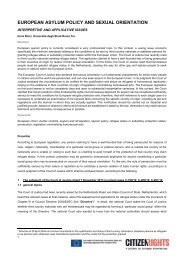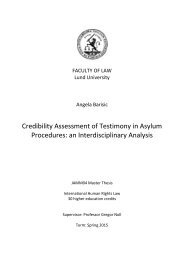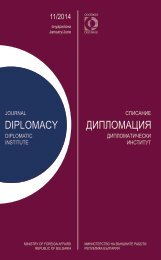AEMI
AEMI-2016-web
AEMI-2016-web
You also want an ePaper? Increase the reach of your titles
YUMPU automatically turns print PDFs into web optimized ePapers that Google loves.
140 <strong>AEMI</strong> JOURNAL 2015<br />
Preferences<br />
Prospective parents are faced with various<br />
choices to make. For instance: which<br />
sending country (or race) to choose, the<br />
age and gender of the adoptable child<br />
and whether to be open to a child with<br />
special medical needs. With such considerations<br />
adoptive parents exercise a<br />
key element of the market: the ability<br />
to make a choice (Goodwin, 2010, 10).<br />
Based on the analyzed Dutch websites<br />
of adoption agencies, parents can express<br />
their preferences, but there seems<br />
to be no variation in the price related<br />
to gender, race or age. However, Higgins<br />
& Smith (2002) and Goodwin (2010)<br />
state that in the US race-based baby valuing<br />
occurs. As Goodwin argues: ‘Couples<br />
may spend upward to fifty thousand<br />
dollars to adopt a healthy white infant.<br />
Black infants, however, are adopted for<br />
as little as four thousand dollars. Adoption<br />
agencies attempt to clarify this<br />
discrepancy by explaining that black<br />
children are more difficult to place than<br />
white children’ (2010, 6). This logic<br />
seems incorrect, because even if black<br />
children are harder to place, why is more<br />
work cheaper? Also biracial children attract<br />
higher prices than black babies.<br />
Graff even states that not only black babies<br />
are cheaper, but older children or<br />
special needs children can be adopted<br />
with a ‘discount’ (2008, 59). Thus, preferences<br />
matter in the ICA market. This<br />
could explain the fact that the US has<br />
the biggest demand for Chinese and<br />
Korean babies, because they are ‘almost<br />
white’ and very young (Selman, 2009).<br />
According to Dorow (2006), Chinese<br />
babies are attractive for US prospective<br />
adoptive parents because they are racially<br />
flexible. In the interviews she had with<br />
US adoptive parents, she was surprised<br />
how several parents fantasized that their<br />
Chinese adopted children were not ‘all<br />
Chinese’. Evidence for some ‘whiteness’<br />
was red highlights in their hair and<br />
how they fit well into a private all-white<br />
school (Dorow, 2006:375).<br />
Several scholars claim that in Europe<br />
racial preferences also play a role. For example,<br />
according to Herrmann (2010)<br />
and Selman (2012), European countries<br />
such as Spain, Germany and France<br />
are adopting Russian children in large<br />
numbers. This is likely because of the<br />
availability in Russia of ‘Eurasian children’<br />
and that Russia is able to meet the<br />
desires of the prospective parents (Herrmann,<br />
2010, 414). Hilbrand Westra of<br />
United Adoptees International (UAI),<br />
an organization that criticize the adoption<br />
market and its tendency towards<br />
child trafficking, confirms in an interview<br />
8 that racial categorization occurs<br />
in the ICA market. The white children<br />
are most wanted, followed by the light<br />
colored Asian children, biracial children,<br />
the dark colored Asian children<br />
and last, the African children.<br />
Conversely, there are some mechanisms<br />
involved in the ICA process that<br />
go against the idea of choice because<br />
some parents are considered as being<br />
incompetent in the ICA market. Their<br />
financial, medical and personal status<br />
defines whether they are suitable candidates<br />
or not. Especially their financial<br />
status plays a significant role (Graff,<br />
2008). Due to the high costs involved<br />
it is impossible for persons with a low<br />
income to adopt a child. Therefore, it<br />
can be said that with market mechanisms<br />
within ICA, the (white) rich always<br />
outbid the poor or low-income









